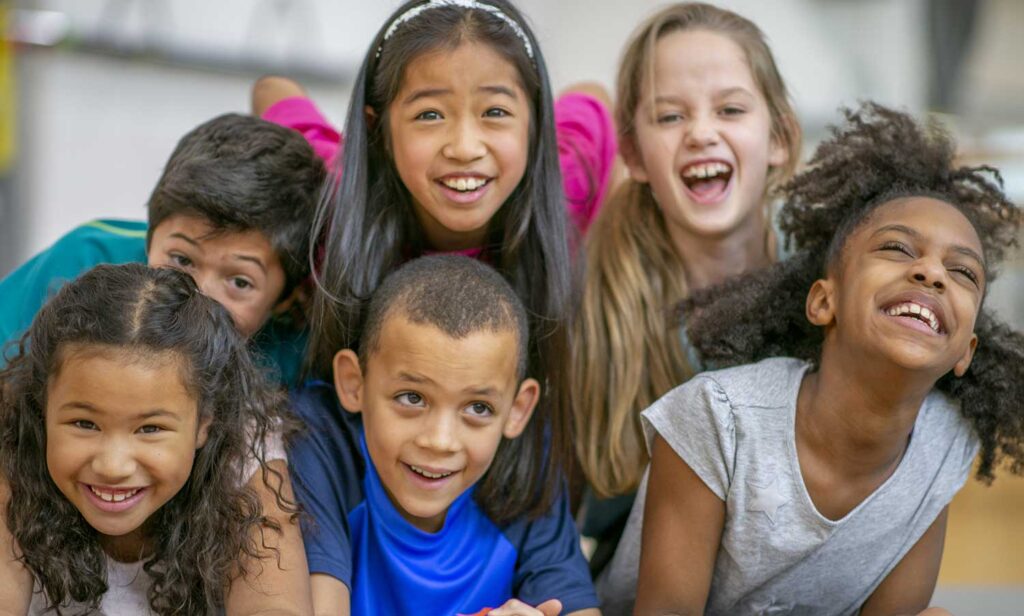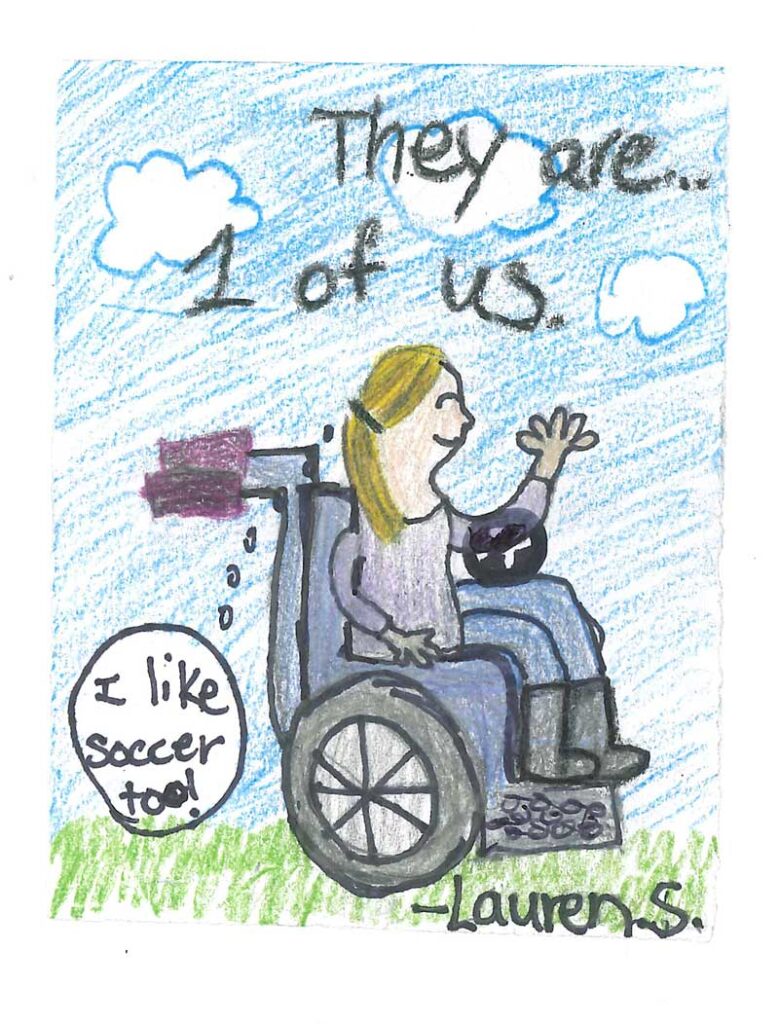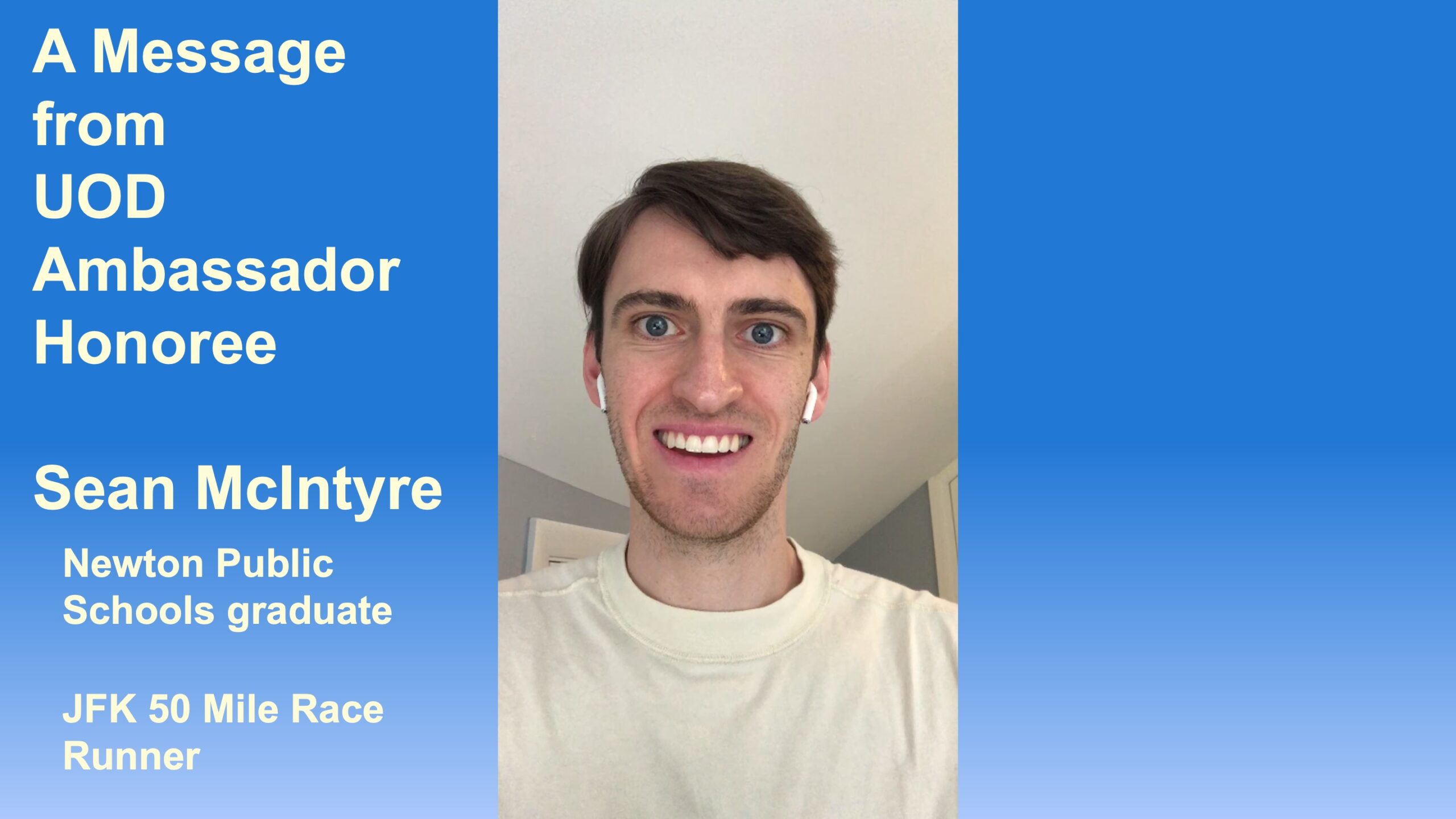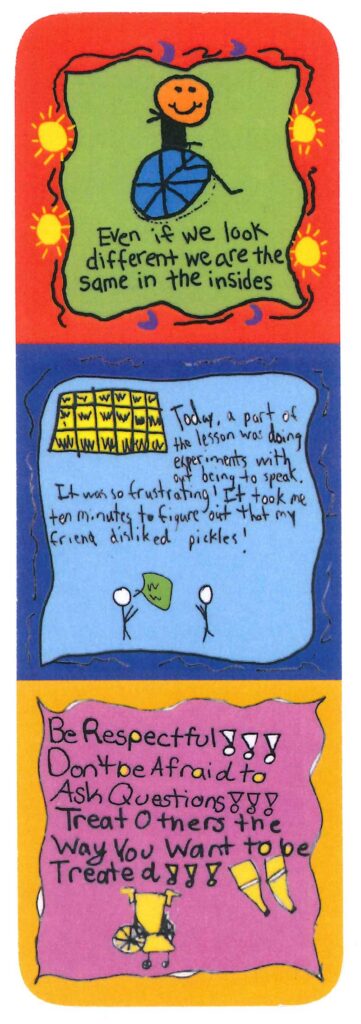Our Impact
The Understanding Our Differences program has a significant positive impact on students, schools and communities. As a result of participating, students exhibit inclusive behavior, increased empathy, and improved social skills, leading to a better school climate for all.
Students also develop lasting attitude change, which they take with them as they move through their schooling and into work and community life as adults. They recognize that those with disabilities are people first, with the same hopes and dreams as everyone else. Further, UOD has been essential in developing an admirably inclusive culture in Newton where it originated and the other communities it serves, where members of the school and community at large learn to embrace and celebrate all individuals for who they are and for their abilities.

The thing I will remember all my life is that people with disabilities are just like you and me and want to be treated with respect.”
— 5th grade student
What People Say
Administrators
UOD is the culture changing agent that is so important in developing an inclusive community.
— Dr. Jen Price, Head of School, Buckingham Browne & Nichols; past superintendent, North Andover Public Schools
One of the defining values of the Newton Public Schools is a long-standing commitment to successfully including students with a wide range of disabilities into the general curriculum. Understanding our Differences is an integral partner in helping to ensure that all our students are prepared to enter the world as empathetic, engaged and respectful citizens.
— Dr. David A. Fleishman, Former Superintendent of Schools, Newton, MA
I have seen this program at work! I happened into one of the sessions at the Dallin Elementary School and have heard wonderful things about it; I would absolutely support its expansion.
— Dr. Elizabeth Homan, Superintendent of Schools, Arlington, MA

Principals
The programs that you have arranged have helped us to grow in our respect for each other, our ability to communicate with integrity, and our understanding of both our individual challenges and our collective strength.
— Newton Elementary School Principal
The program is a core part of the social education at our school We know that the units provided had a significant impact not only on students, but all faculty. We are confident that the lessons helped promote understanding and tolerance for individual differences.
— Newton Elementary School Principal
Parents
My son, who is deaf in one ear, was absolutely electrified by the UOD Deafness presentation. He is private and can be reserved about his hearing loss. But he absolutely shone through the whole unit. He loved that he knew more sign language, that he knew all about the technology, etc. UOD really transformed his disability from something that made him feel a bit less, to feeling a bit more
— Elementary school parent
We recently had a conversation at our dinner table and my now 15 year old daughter talked clearly about epilepsy. “How did you know this?” I asked. She remembered learning about epilepsy during the UOD program when she was in elementary school in Newton!
—High school parent
Programs like UOD will arm our children with the knowledge and information on how they can embrace the students around them, and learn why their friends might be different from them.
—Sean McIntyre

Teachers
It’s so important for students to have these windows and mirrors to learn more about other people and see themselves reflected, as well. My students seemed to really enjoy the program that focused on blindness. I think they particularly liked having the chance to ask questions and get immediate responses from the speaker.
— Teacher, Arlington, MA
I was especially impressed by the questions that our students asked when given the opportunity to learn more about the individuals they met during their presentations. Our kids were showing curiosity and interest in the lives of others.
— Teacher, Arlington, MA
The presentation on learning disabilities sparked wonderful, meaningful conversations in our classroom. I was touched when several students felt safe to share their personal experiences with disability with the class.
— Teacher, Arlington, MA
Program Speakers
I give our school system immense credit for introducing the “Understanding our Differences” program that seeks to give students empathy and understanding for classmates who might come off as “different” in a number of apparent and not so apparent ways. Since elementary school, I’ve dealt with various learning disabilities and it’s been a distinct pleasure to talk about these with kids.
— Speaker for Learning Disabilities unit
My son and I had a wonderful experience being part of the UOD Deaf and Hard of Hearing presentation. We both have bilateral hearing loss and wear hearing aids, and it was a great opportunity for us to share both the commonalities and differences across our experiences and help students understand what it’s like to live with hearing loss.
—Speaker for Deafness and Hard of Hearing Unit
Author
I think that programs like Understanding Our Differences, which introduce children in elementary schools to people who are different and allow children to ask those questions, so break down barriers in our society. It does so much to allow people to see the essential humanity in people. There is nothing more urgent than doing that.
— Author Andrew Solomon

Watch our recent video celebrating 45 years of Understanding Our Differences. Hear from teachers, administators, and people with different abilities about the positive impact UOD has had on so many.
Ongoing Research
To measure the impact of the Understanding Our Differences program, we have worked with evaluators at the Center for Developmental Disabilities Evaluation and Research (CDDER) at UMass Medical School to create and refine UOD’s logic model and develop survey tools to measure short term outcomes.
CDDER helped us create pre- and post-program pilot surveys to assess short-term attitude change, including students’ increased knowledge about disabilities; students’ gaining perspective and empathy for others’ experiences; students’ gaining skills to be more socially inclusive; and development of age-appropriate social skills.
An initial pilot of pre- and post-test surveys (of our Blindness and Low Vision unit, grade 3) showed many more students scored a perfect 100% on the post-test than on the pre-test. Additionally, 46% of the students scored higher on the post-test than they did on the pretest. Overall results showed a positive trend in student knowledge gain and attitudinal change, particularly in the areas of meeting a person with low vision, teaching students that people with low vision can do lots of things and that students can talk to people with low vision.
We also have had an engagement with Pro Bono Analytics, a partnership of analytics professionals with nonprofit organizations who want to make their data work for them. We have worked with a team of three data analytics professionals, including a professor from UMass Boston. The team looked at our previously collected data, and confirmed by data analysis that we can prove that students learn from our program. Working together, we have devised surveys that also include questions to help measure attitude change. These surveys will be presented to students in the current school year and the resulting data analyzed.
Alignment with Massachusetts State Standards
Social-Emotional Learning
The Understanding Our Differences program aligns with one of the five core strategies of the Massachusetts Department of Elementary and Secondary Education (DESE) strategic plan (updated in 2019): Social-Emotional Learning. According to DESE, “Research and experience demonstrate that preparing all students for success (in school, the workplace, civic life, and more) includes attending to their social-emotional and health development.
“Furthermore, academic and social-emotional competencies are mutually reinforcing… It is our goal to promote systems and strategies that foster safe, positive, healthy, culturally competent, and inclusive learning environments that address students’ varied needs and improve educational outcomes for all.” (See https://www.doe.mass.edu/research/StrategicPlan-Summary.pdf)
History and Social Science Curriculum Framework
The Understanding Our Differences program aligns with the Massachusetts History and Social Science Curriculum Framework. These frameworks include guiding principles for all grade levels, K-12. According to Guiding Principle 10, “An effective history and social science education develops social and emotional skills. Social and emotional learning has demonstrated an increase in academic achievement and communication skills, improved attitudes and behaviors, and development of empathy.[1] These skills are also practical civic skills that students need to engage effectively with others in the public problem solving of civic and democratic life.
“Teachers support the development of these skills by…increasing students’ capacity to participate in dialogue across differences and to take on the perspectives of others whose experience and position in the world differs from their own (dialogue and perspective-taking);…[and] encouraging students to collaborate respectfully with diverse peers (relationship skills).”
(See https://www.doe.mass.edu/frameworks/hss/2018-12.pdf)
[1] Jones, Stephanie M. and Kahn, Jennifer (2017). The Evidence Base for How We Learn: Supporting Students’ Social, Emotional, and Academic Development. Washington, DC: The Aspen Institute, National Commission on Social, Emotional, and Academic Development. (see also https://assets.aspeninstitute.org/content/uploads/2018/03/FINAL_CDS-EvidenceBase.pdf)
